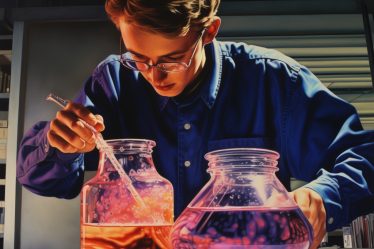
Biochemistry stands at the crossroads of biology and chemistry, exploring the vast chemical processes that define living organisms. This guide is designed for beginners and those with a budding interest in the molecular mechanics of life.
At its core, biochemistry helps us understand the molecular foundations of life. It involves studying proteins, lipids, carbohydrates, nucleic acids, and other biomolecules that play crucial roles in cellular functions. Biochemistry is everywhere, from how your body digests food to how plants convert sunlight into energy.
Here’s a Glimpse of What You’ll Learn About What is Biochemistry:
- Biochemistry Fundamentals: Explore basic concepts and the role of key biomolecules.
- Biochemist Roles: Understand their impact in medicine, agriculture, and environmental science.
- Metabolic Pathways and Enzymes: Learn about crucial biochemical reactions.
- Biochemistry Education Journey: From Undergrad courses to a PhD in Biochemistry.
- Biochemistry in Daily Life: Insights into its application in healthcare, food science, and more.
- Computational Biochemistry: The fusion of technology with biological research.
- Essential Biochemistry Terms: Get to know the language of biochemistry.
- Benefits of Biochemistry Tutoring: Enhance learning with personalized guidance.
Are you interested in other subjects? Read top free study guides for Biology, English, French, and Music.
What is Biochemistry: Introduction
But what does a biochemist do, exactly? They delve into life’s molecular mechanisms, often leading to health, medicine, agriculture, and environmental science breakthroughs. The work of biochemists is vital in developing new drugs, enhancing food production, and tackling environmental issues.
If you’re pondering a career in biochemistry or want to deepen your understanding of the subject, this guide is a great starting point. Along the way, we’ll explore the various aspects of biochemistry, from its basic concepts to its practical applications. Plus, we’ll offer insights into how tutoring and private lessons can enrich your learning experience. Whether through one-on-one classes or group sessions, a tutor can help you quickly navigate biochemistry’s intricacies.
What Biochemists Do: Exploring Roles in Biochemistry
Biochemistry, as a field, is dynamic and far-reaching. Central to this discipline are biochemists, who play a pivotal role in advancing our understanding of biological processes. Let’s explore what biochemists do and how their work impacts the world around us.
All you need to know about vitamins and minerals.
The Work of Biochemists: Deciphering Biochemical Processes
Biochemists focus on understanding the chemical processes within living organisms. Their research sheds light on how biochemical reactions happen in the body and their effects. This includes studying the structure of essential molecules, how genes are turned into proteins, and the metabolism pathways. Their role is vital across several fields. In medicine, they are crucial to creating new treatments and drugs to combat diseases. In agriculture, their work aims to improve crops and directly manage pests affecting the food supply. In environmental science, they study and find solutions to reduce pollution and promote sustainability.
The methods used by biochemists vary widely, from traditional molecular biology to advanced computational modeling. These diverse techniques allow a thorough analysis of complex biological systems, often leading to significant scientific breakthroughs.
For students of biochemistry, tutoring, and private lessons can be essential. They offer personalized support, helping to clarify challenging concepts and provide practical insights into biochemistry.
Fundamental Concepts in Biochemistry: Understanding the Basics
Biochemistry is built on a foundation of critical concepts vital for understanding life at a molecular level. This section will cover these foundational ideas, giving you a solid base to explore further what biochemistry encompasses.
Key Biochemical Processes: The Building Blocks of Life
Every living organism is a complex system powered by biochemical processes. These processes include metabolism, which involves a set of life-sustaining chemical reactions, and enzyme kinetics, which studies the rates of biochemical reactions. Understanding these processes is crucial for grasping the basics of biochemistry.
Metabolism is central to biochemistry. It consists of two primary types: anabolism (building up molecules) and catabolism (breaking down molecules). These metabolic pathways are responsible for the energy flow through an organism, essential for maintaining life.
Enzymes play a critical role in regulating these metabolic reactions. They act as catalysts, speeding up chemical reactions without being consumed. The study of enzymes involves understanding how they interact with substrates and the factors affecting their activity, such as pH and temperature.
Computational Biochemistry: Merging Biology with Technology
Computational biochemistry combines biology, computer science, and math. It uses computer simulations to study and predict how biological systems behave. This mix of biology and technology is critical for advancements in drug development and understanding protein structures.
This field is becoming more vital as it allows for virtual experiments, which can speed up research and discovery. For students, learning about computational biochemistry opens up new, innovative areas in the field.
Understanding concepts like metabolic pathways and computational models can be challenging. Tutoring or private lessons can help make these subjects more understandable. Tutors provide personalized help, making learning these essential aspects of biochemistry easier.
The basics of organic and inorganic chemistry.
Educational Pathways in Biochemistry: Navigating Your Studies
A journey through biochemistry education is both challenging and rewarding. This section outlines what students typically learn in biochemistry courses and the progression toward higher education, such as pursuing a Ph.D.
What You Learn in Biochemistry Courses: Building a Strong Foundation
Biochemistry courses at the undergraduate level provide a comprehensive introduction to the basics of the field. You’ll start with learning about the structure and function of biomolecules such as proteins, carbohydrates, lipids, and nucleic acids. These components are crucial for understanding cellular processes and the molecular basis of life.
As you progress, courses will cover more advanced topics like molecular genetics, bioenergetics, and metabolic pathways. You’ll learn how genes are expressed and regulated, how energy is generated and used in cells, and how different metabolic pathways interact.
Practical laboratory work is an essential part of biochemistry education. Labs allow you to apply theoretical knowledge, conduct experiments, and develop crucial scientific skills. These hands-on experiences give you a deeper understanding of biochemical methods and techniques.
Pursuing a PhD in Biochemistry: Advancing Your Knowledge and Career
Pursuing a PhD can be fulfilling for those interested in diving deeper into biochemistry. A PhD in biochemistry involves extensive research and contributes new knowledge. You’ll work on complex problems, often at the cutting edge of science, and your research could lead to significant discoveries or advancements in biochemistry.
During a PhD program, you’ll develop critical thinking, problem-solving, and scientific communication skills. These skills are valuable in academia and industries like pharmaceuticals, biotechnology, and healthcare.
If you’re considering this path, remember it’s rigorous and requires dedication. Tutoring and private lessons can be incredibly beneficial during your PhD journey, providing personalized guidance and support. A private teacher can help you navigate the complexities of advanced biochemistry topics and research methodologies.
Learn about chromatography and solutions and mixtures.
Biochemistry’s Impact: From Healthcare to Everyday Life
Biochemistry is integral in various fields, significantly impacting healthcare, agriculture, and daily activities.
Medical Biochemistry’s Role in Healthcare
In healthcare, biochemistry is vital for understanding and treating diseases, developing drugs, and advancing diagnostics. Medical biochemists analyze body fluids and tissues to understand disease mechanisms and develop medications. Their work studying enzymes and hormones is crucial for managing diabetes and understanding genetic disorders. Biochemistry also drives the creation of vaccines and therapeutic drugs, pivotal in global health improvements.
Biochemistry in Daily Life
Beyond the lab, biochemistry influences everyday life. It’s present in the food we eat, the household products we use, and the body’s metabolic processes. In the kitchen, enzymatic reactions are crucial to cooking and food preservation. Biochemistry also contributes to environmental conservation, helping us understand natural biochemical cycles and tackle pollution and climate change issues.
Learn everything you have to know about greenhouse gases and nuclear fusion.
Exploring the Biochemistry Glossary: Key Terms and Concepts
Biochemistry is rich with specific terms and concepts fundamental to understanding the field. This section demystifies some of these terms, providing clear explanations for beginners and students.
Understanding Biochemical Molecules: Proteins, Lipids, and More
At the heart of biochemistry are the molecules that make up living organisms. Here are some essential biomolecules:
- Proteins: These are complex molecules made of amino acids. Proteins perform a vast array of functions in the body, including catalyzing metabolic reactions, replicating DNA, and responding to stimuli. Learn about the peptide bond.
- Lipids: These naturally occurring molecules include fats, waxes, and specific vitamins. Lipids are crucial for storing energy, signaling, and acting as structural components of cell membranes. Learn about fatty acids.
- Carbohydrates: Comprising sugars, starches, and cellulose, carbohydrates are essential for energy storage and structure. They are also involved in cell recognition and signaling processes.
- Nucleic Acids: DNA and RNA are nucleic acids with genetic information. They play a central role in the synthesis of proteins and the regulation of cellular activities.
Concluding Thoughts and Further Learning in Biochemistry
As we reach the end of our guide, it’s clear that biochemistry is a diverse and dynamic field integral to understanding life’s molecular mechanisms and solving various challenges in health, environment, and technology.
Tutoring and Personalized Lessons in Biochemistry
While biochemistry can be complex, the proper guidance can make a significant difference. Tutoring and personalized lessons offer tailored learning experiences, making difficult concepts more digestible. A tutor or private teacher can provide one-on-one attention, ensuring you grasp the subject’s nuances. Whether you’re preparing for exams, tackling tough topics, or pursuing advanced studies, consider the benefits of private tutoring to enhance your understanding and proficiency in biochemistry.
Are you looking for a biochemistry or a chemistry tutor? Enter “chemistry tutor Glasgow” or “biochemistry teacher Sheffield” on your preferred tutoring platform, such as meet’n’learn, to find a teacher who can meet your specific needs.
If you thrive in group learning environments, search “chemistry classes London” or “biochemistry lessons Manchester” online to discover local schools offering chemistry lessons.
Read more topics and expand your chemistry horizons! Our World of Chemistry offers a plethora of free educational blogs.
Frequently Asked Questions About Biochemistry
1. What is Biochemistry, and Why is it Important?
Biochemistry is the study of chemical processes in living organisms. It’s crucial for understanding biological functions and is fundamental to medicine, nutrition, and environmental science.
2. What Does a Biochemist Do?
Biochemists research the chemical characteristics and reactions of living organisms. They work in various areas, including medical research, pharmaceutical development, and agricultural innovation.
3. What Can You Do with a PhD in Biochemistry?
A Ph.D. in biochemistry opens career paths in academia, research, biotechnology, and pharmaceutical industries. It equips graduates for roles in scientific research, lecturing, and specialized consultancy.
4. What are the Key Concepts Learned in Biochemistry?
Essential concepts include metabolic pathways, enzyme kinetics, molecular genetics, and the structure and function of biomolecules like proteins and nucleic acids.
5. How is Computational Biochemistry Changing the Field?
Computational biochemistry uses computer simulations and models to predict and analyze biological processes. It’s revolutionizing the field by enhancing drug development and understanding complex biochemical systems.
6. What is the Role of Biochemistry in Medicine?
Biochemistry plays a vital role in medical diagnostics, drug development, understanding diseases at a molecular level, and developing therapeutic strategies.
Ethanol and Alcohols in chemistry, Fermentation, and how Beer is Made.
References:
1. McGill
2. Britannica
3. Wikipedia



